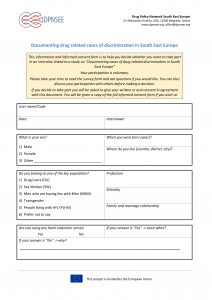The basic human rights of marginalised groups in South East Europe are violated and they are marginalised and discriminated. Stigmatisation in the society is strong and incorporated in cultural patterns. DPNSEE, with the support of its member organisations, is launching a survey to document cases of discrimination of drug users and connected vulnerable and marginalised groups and produce an analysis of the findings. The survey shall indicate different forms of discrimination and will serve as basis for additional actions on safeguarding human rights of affected groups.
The most frequent cases of discrimination are related to stigmatization in various respects, the relationship between the police and the judicial system (including the right to information in criminal proceedings), the protection of personal data, basic and specific health care, social protection, the right to education, employment and many other areas of life which should be available to every person.
The questionnaire is not intended to be filled by beneficiaries, but by organisation’s activists, preferably those who already have established relation with persons from key populations. Before filling in the document by interviewing people, their task is to explain them the aim, process and content of the document, give them the information about the research and approve their participation. Only then, they should go through the questionnaire with the key population member.
For the country contexts, you are free to adjust it to your own country, as we are just mapping the situation. The questionnaire should serve more like a guideline to you, as we repeat that it is not research per se, but rather initial mapping.
 DPNSEE would very much appreciate if an organisation would join this effort and help us to document the case of discrimination. Please, use the tool which is available for downloading following this link>>>
DPNSEE would very much appreciate if an organisation would join this effort and help us to document the case of discrimination. Please, use the tool which is available for downloading following this link>>>
Should you need any help on this issue, please don’t hesitate to contact us at office@dpnsee.org.
The deadline we set is 6 June 2018! Please, use the above-mentioned e-mail address.




















